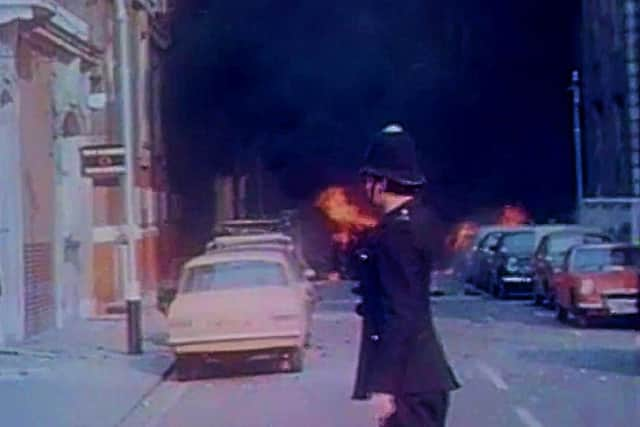Irish border poll 1973 remembered: Unionist recollections of massive pro-Union vote amid SDLP boycott and deepening sea of violence
and live on Freeview channel 276
On March 8, 1973, amid the emerging tit-for-tat bloodbath of the Troubles, the government staged a poll to show the democratic weight behind the Province’s place in the Union.
It was boycotted by nationalists, with the SDLP voicing the view that it could inflame tensions.
Advertisement
Hide AdAdvertisement
Hide AdThe result was that the turnout was only 59%, of which 98.9% voted in favour of the Union.
Jim Nicholson was aged around 22 at the time, and was involved with the UUP as an organiser.
Later, by the mid-70s, he had become a councillor, then went on to serve as an MEP for three decades.
Based in the Armagh area at the time of the referendum in 1973, he recalls reports of some non-unionists turning up to vote for remaining in the UK.
Advertisement
Hide AdAdvertisement
Hide Ad"One person in particular came in and made it very clear what they were doing, and why were they doing it," he said of one such voter.


"I'm not saying it was widespread, but it was just something which stuck in my mind because one has to remember it took a very brave person to actually come out and make that declaration at that time.
"And he wouldn't have been a natural unionist supporter, let's put it that way."
What would happen in a poll today?
"I'd be fairly confident the people would vote to remain in the UK," he said.
Advertisement
Hide AdAdvertisement
Hide Ad"Even though things in recent years have maybe put that under more strain with the problems we have with no Executive and Stormont, and Brexit certainly made a big difference to some people."
He added: "But at the same time, don't get me wrong, I'm not in favour of a border poll, I don't think we need one. Because once we start that particular operation, it's potentially working towards another border poll.
"I happen to hold a very strong view on referendums. I'm not necessarily a great supporter of them.
"We only have to look at what happened with Brexit, all the misinformation there was.
Advertisement
Hide AdAdvertisement
Hide Ad"So I think if the UK is going to decide the future of the whole of the UK, they need to have a different point of view - there needs to be weighted majorities. 50%+1 doesn't work.”
Jim Shannon was just too young to vote in the referendum, being a couple of weeks away from his 18th birthday, but recalls his parents voting.
"If we got a vote like that today, wouldn't it be fantastic?" he joked of the 98.9% pro-Union outcome.
"I think what we have to look at today is there's still a large majority of people in Northern Ireland committed to retaining us being in Great Britain and Northern Ireland.
Advertisement
Hide AdAdvertisement
Hide Ad"I mean, what are the advantages today of a united Ireland? I think there's maybe people down south saying to themselves do we really want the unionists from Northern Ireland as part of us."
He cited the lack of a fully free NHS, and a higher cost of living, saying: “All these things tell us the fanciful green-tinged view of a united Ireland is one that doesn't attract every person... it certainly doesn't attract some of the nationalists."
• POLL CAME AMID TIDE OF VIOLENCE •
By the time the poll was held in 1973, some 756 people had already been killed according to the Conflict Archive on the Internet.
Just in the week leading up to it, the following deaths took place:
March 1:
Advertisement
Hide AdAdvertisement
Hide AdStephen Kernan, 54, Catholic civilian taxi driver, shot by the UVF, west Belfast
Daniel Bowen, 38, Catholic civilian, killed by unknown, Belfast city centre
March 2:
Pat Crossan, 34, Catholic civilian bus driver, shot by the UVF, west Belfast
George Walmsley, 52, Protestant civilian, killed by unknown republicans, north Belfast
March 3:
Advertisement
Hide AdAdvertisement
Hide AdDavid Deacon, 39, Protestant UDR man, killed off duty by the IRA, Londonderry
March 4:
Gary Barlow, 19, British soldier, shot by the IRA, west Belfast
March 5:
Ray Hall, 22, British soldier, shot by the UVF during rioting a month earlier, east Belfast
March 6:
Anton Brown, 22, British soldier, shot by the IRA, west Belfast
Advertisement
Hide AdAdvertisement
Hide AdOn the day of polling itself, the following deaths took place:
David Glennon, 45, Catholic civilian, shot by unknown loyalists, north Belfast
John Green, 21, British soldier, shot by the IRA while guarding a polling station, west Belfast
Joe Leahy, 31, British soldier, blown up two days earlier by IRA in an booby-trap bomb at Mullaghbawn, Co Armagh
Advertisement
Hide AdAdvertisement
Hide AdIn addition, the IRA exploded two car bombs in London – one at the Old Bailey, one at Scotland Yard.
These injured over 200 people and one person died due to a heart problem. Two other car bombs were defused.
Among those behind the attacks were the notorious Price sisters and Gerry Kelly MLA, today Sinn Fein’s spokesman on policing matters.